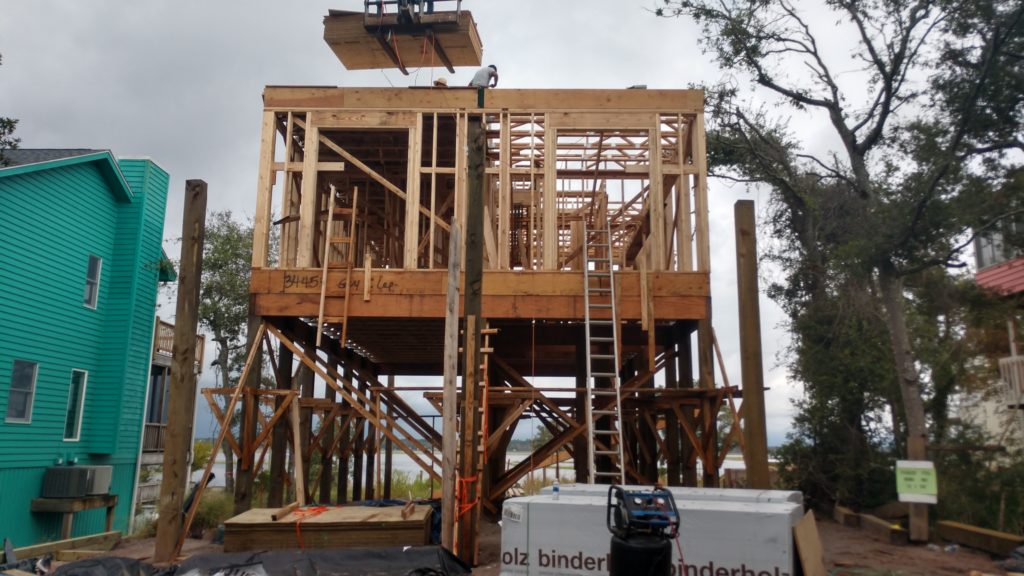Without a doubt, you can save a lot of money, in the short run, by hiring an independent construction contractor or handyman to do your home improvement projects. Often, you can find a neighbor, friend, or relative who is willing to add that deck or remodel your kitchen at a fraction of the cost of hiring an established licensed General Contractor and often, start the project much quicker. But, there are some pitfalls to hiring a “friend” or someone you found on Craigslist. Note: “North Carolina requires that anyone who contracts with another person or entity to construct or make improvements to any building, highway, or public utilities, including grading, or who undertakes to superintend or manage such activities, be licensed as a General Contractor if the work costs $30,000 or more.”
One of the major issues with hiring an independent contractor, neighbor, friend, or family member, is that they may not have suitable insurance to protect you, the homeowner, in the event of damages or injuries. Often, but not always, an independent contractor may not have general liability and workman’s compensation insurance. You can do an internet search and find many articles explaining the risk a homeowner incurs when the workers on their projects are not properly insured. Many homeowners assume contractors, and their employees, working in their homes have their own insurance or are covered by the homeowner’s insurance. This is not always the case and a homeowner can be held liable for damages or injuries of the independent contractor, neighbor, or friend.
So, how can a homeowner protect themselves? The best way is to require the person working on your project to provide a Certificate of Insurance (COI) prior to the exchange of any money or work starting. Once the homeowner receives the COI, they should then call the insurance provider to verify that it is a valid COI. Do not allow anyone receiving payment from you to work on your project unless you have verified their insurance. Of note, the main reason a “legitimate contractor” costs more, is because of the insurance and payroll taxes paid on each employee working on your project.
The second major issue with hiring an independent contractor, someone from Craigslist, or a “company” from out of town is losing your deposit for work that is never started or not finished to the satisfaction of the owner. Most contractors legitimately need a deposit from a homeowner to schedule a project, ensure they have enough employees, purchase material, and pay overhead (insurance). Most homeowners are honest and well intentioned, but just as there are shady contractors, there are shady and dishonest homeowners who will find a million reasons why they are not going to pay for a service. Contractors must mitigate this risk just as the homeowner needs to mitigate their risk.
Once again, how does a homeowner protect themselves from losing their deposit? By hiring an established business that has an established business location. If a homeowner does need to take legal action for failure to perform, half the battle is finding the shady contractor. Additionally, a legitimately licensed General Contractor values their license and usually will not risk losing it. A homeowner has a means of recourse by contacting the state General Contractor licensing board to lodge a complaint against a General Contractor who did not perform a specified service. Also, generally speaking, a business that takes the time and spends the money to establish a presence in your community (office location, marketing campaign, office manager, website, and working phone numbers) is not usually looking to “run off” with a client’s money.
And finally, what if there is a problem with your finished project six months after it is complete? Hiring a “friend” or independent contractor may save you money now, but who do you call in six months when a workmanship problem presents itself? Legitimate General Contractors are going to offer you a warranty coverage (often a year) and will have an established presence so that you can find them six months later. That is less often the case with independent contractors or your neighbor, who no longer has time to mess with your project. Word of mouth matters for everyone, but it especially matters for an established business that has a social media presence where clients can provide feedback on the General Contractor’s performance. That doesn’t mean you should believe everything you read on a website (google, facebook, yelp, etc), but you may see a pattern of good or bad that can help you make a decision.
Nothing in this article should be construed to imply that only licensed General Contractors should be hired for your project. That is absolutely not the case, because there are many great independent small contractors and handymen that you can hire. But, when hiring for your project, make sure you do adequate background checks on the person you are hiring, ensure that you have a very detailed scope of work (preferably in a contract) for what you want done (even with family members), a work schedule, and a draw-schedule for payments. Also, make sure you understand if you need permits and who will be responsible for acquiring the permits and what the consequences are for failing inspections. And verify insurance! Oh, and one final thing in case you didn’t hear, verify insurance.


